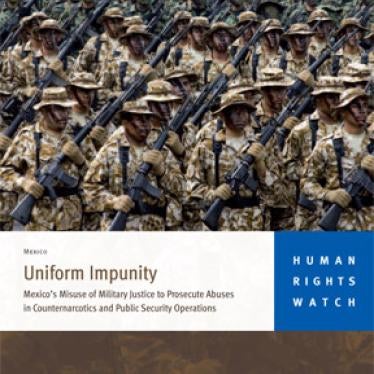(Washington, DC) - A ruling on July 6, 2011, by Mexico's Supreme Court should bring reform of Mexico's flawed military justice system and accountability for soldiers accused of human rights violations closer, Human Rights Watch said today. The court ruled that Mexico's courts are obligated to comply with an Inter-American Court judgment in an enforced disappearance case and that its jurisprudence should be taken into account by Mexico's judges.
In a binding November 2009 judgment, Radilla Pacheco v. Mexico, the Inter-American Court of Human Rights found that the Mexican military was responsible for the disappearance of Rosendo Radilla Pacheco in Guerrero state in 1974 and that the government had failed to investigate the crime adequately. The Inter-American Court ordered Mexico to modify its Code of Military Justice to make it "compatible with international standards," and said that, "Regarding situations that violate the human rights of civilians, military jurisdiction cannot operate under any circumstance."
"Mexico's highest court has found that the Inter-American Court's ruling must be the law of the land: no cases of human rights violations should be tried in the military justice system," said José Miguel Vivanco, Americas director at Human Rights Watch. "President Calderón and Congress should swiftly reform military jurisdiction to ensure that this ruling is upheld."
The Radilla decision is one of four since 2008, including two in 2010, in which the Inter-American Court found that members of Mexico's military committed grave human rights violations against civilians. In August 2010, the Inter-American Court found that Valentina Rosendo Cantú and Inés Fernández Ortega, indigenous women from Guerrero, had been raped and tortured by members of the army in 2002. In December 2010, the court ruled the military had detained and tortured two peasant ecologists, Rodolfo Montiel and Teodoro Cabrera. The Inter-American Court has repeatedly stated that military jurisdiction should not apply to any human rights violations committed against civilians, a requirement Mexico has not met.
In October 2010, Calderón proposed reforms to the military justice system that fall short of what is required by the Inter-American Court's rulings, Human Rights Watch said. The proposal would require that three types of human rights violations - enforced disappearance, rape, and torture - be tried before civilian jurisdiction, while other serious violations would continue to be investigated and prosecuted within the military justice system. It would also grant military authorities the power to determine which acts constitute such violations, despite the military's track record of downgrading the severity of charges against soldiers.
On July 7, the Supreme Court will take up the relevance of international human rights standards in relation to Mexico's constitution. Human Rights Watch urges the Supreme Court to safeguard the recent constitutional reform passed by Congress, which elevates the rights enshrined in international treaties signed by Mexico to equal footing alongside the rights guaranteed by the Mexican Constitution. As a party to international treaties, Mexico has an obligation to give effect to such rights in its domestic law, as well as to take their jurisprudence into account in judicial proceedings - an obligation the Supreme Court should uphold.
"The justices have upheld a view espoused by UN bodies, as well as in recent decisions in the European, Inter-American, and African human rights courts that limit the application of military jurisdiction in cases where its impartiality is questionable," Vivanco said.
In the draft principles on military justice adopted by the former United Nations Human Rights Commission, principle No. 9 states that, "In all circumstances, the jurisdiction of military courts should be set aside in favour of the jurisdiction of the ordinary courts to conduct inquiries into serious human rights violations such as extrajudicial executions, enforced disappearances and torture, and to prosecute and try persons accused of such crimes." This has also been the position of the European human rights bodies and the African Commission on Human and Peoples' Rights.
Judgments of the European Court of Human Rights (ECHR) also indicate that trials before military courts can raise fair trial concerns. For instance, in Findlay v. United Kingdom, the ECHR reasoned that for a ruling to be independent and impartial, it has to have some degree of finality. It found that a military court's ruling was neither independent nor impartial, because the members of the court who issued the decision were subordinates of the prosecuting officer, who had the authority to change any decision that the court made. In Suleiman v. Sudan, the African Commission on Human and People's Rights held not only that the military tribunal was not impartial, but also reaffirmed that military tribunals should only "determine offences of a purely military nature committed by military staff" and "should not deal with offences which are under the purview of ordinary courts."
As Human Rights Watch documented in its report "Uniform Impunity," in Mexico the secretary of defense wields both executive and judicial power over the armed forces. Military judges have little job security and may reasonably fear that the secretary could remove them or otherwise sideline their careers for issuing decisions that he dislikes. Civilian review of military court decisions is very limited. To make matters worse, there is virtually no public scrutiny of, or access to information about, what actually happens during military investigations, prosecutions, and trials, which can take years.







